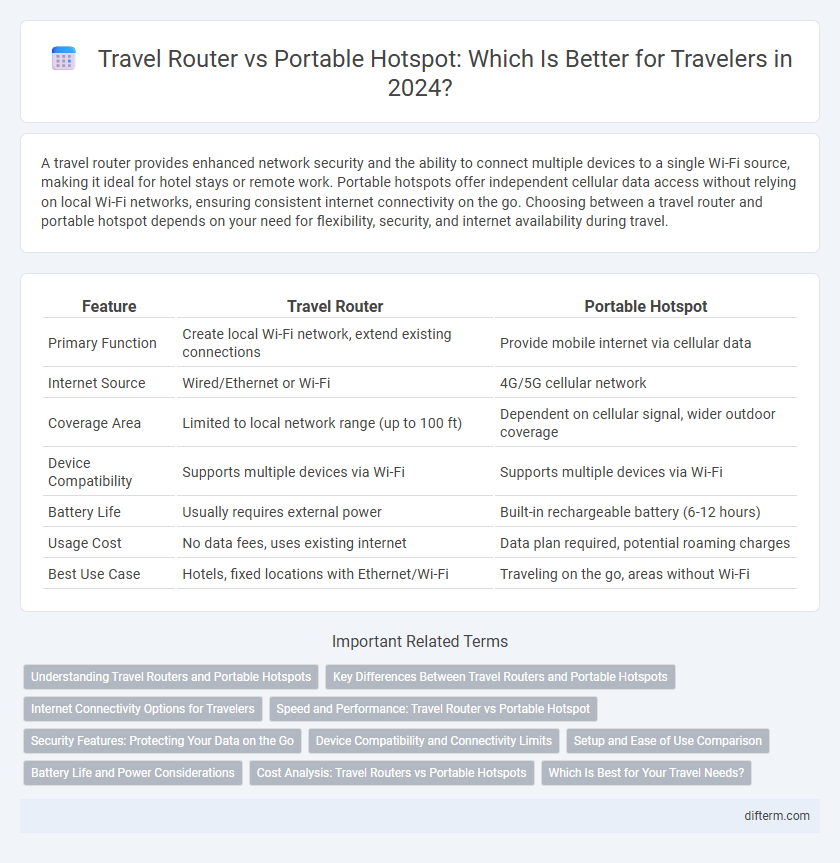A travel router provides enhanced network security and the ability to connect multiple devices to a single Wi-Fi source, making it ideal for hotel stays or remote work. Portable hotspots offer independent cellular data access without relying on local Wi-Fi networks, ensuring consistent internet connectivity on the go. Choosing between a travel router and portable hotspot depends on your need for flexibility, security, and internet availability during travel.
Table of Comparison
| Feature | Travel Router | Portable Hotspot |
|---|---|---|
| Primary Function | Create local Wi-Fi network, extend existing connections | Provide mobile internet via cellular data |
| Internet Source | Wired/Ethernet or Wi-Fi | 4G/5G cellular network |
| Coverage Area | Limited to local network range (up to 100 ft) | Dependent on cellular signal, wider outdoor coverage |
| Device Compatibility | Supports multiple devices via Wi-Fi | Supports multiple devices via Wi-Fi |
| Battery Life | Usually requires external power | Built-in rechargeable battery (6-12 hours) |
| Usage Cost | No data fees, uses existing internet | Data plan required, potential roaming charges |
| Best Use Case | Hotels, fixed locations with Ethernet/Wi-Fi | Traveling on the go, areas without Wi-Fi |
Understanding Travel Routers and Portable Hotspots
Travel routers create a private Wi-Fi network by connecting to existing wired or wireless internet sources, enabling multiple devices to share a secure local connection. Portable hotspots use cellular data networks to provide internet access by acting as a standalone mobile Wi-Fi source with its own SIM card. Choosing between a travel router and a portable hotspot depends on factors like availability of wired internet, cellular coverage, and the need for secure, shared connectivity during travel.
Key Differences Between Travel Routers and Portable Hotspots
Travel routers create private Wi-Fi networks by connecting to existing wired or wireless internet sources, offering enhanced security and multiple device connections, while portable hotspots provide internet access via cellular networks, relying on mobile data plans for connectivity. Travel routers often require a local internet source, making them ideal for hotels or wired connections, whereas portable hotspots function independently by using SIM cards and cellular signals, providing internet access on the go. Battery life varies, with portable hotspots typically featuring built-in batteries for true mobility, while travel routers may need external power sources, influencing their convenience during travel.
Internet Connectivity Options for Travelers
Travel routers provide flexible internet connectivity by creating a private Wi-Fi network using existing wired or wireless sources, ideal for secure and multiple device connections. Portable hotspots offer dedicated cellular data access through 4G or 5G networks, ensuring internet availability in areas without Wi-Fi infrastructure. Travelers seeking reliable connectivity should consider coverage, speed, device compatibility, and security features when choosing between travel routers and portable hotspots.
Speed and Performance: Travel Router vs Portable Hotspot
Travel routers typically deliver higher data transfer speeds and more stable connections by supporting dual-band Wi-Fi and advanced antennas, optimizing network performance even in crowded environments. Portable hotspots depend on cellular signals, so their speed and latency vary significantly based on carrier coverage and network congestion. For uninterrupted streaming and multiple device connectivity, travel routers generally outperform portable hotspots in speed and reliability.
Security Features: Protecting Your Data on the Go
Travel routers offer advanced security features such as WPA3 encryption, customizable firewall settings, and VPN support to protect your data while on the move. Portable hotspots generally rely on carrier-grade encryption and may lack the robust security customization found in dedicated travel routers. Protecting sensitive information during travel requires prioritizing devices with comprehensive security protocols to prevent unauthorized access and data breaches.
Device Compatibility and Connectivity Limits
Travel routers offer broad device compatibility, supporting multiple Wi-Fi-enabled devices simultaneously without significant speed drops, ideal for connecting laptops, smartphones, and tablets. Portable hotspots depend on cellular networks and may have limited device connections, often capping at 10 devices, which can restrict high-bandwidth activities. Travel routers typically provide more stable and expansive connectivity options, including Ethernet ports, enhancing versatility compared to the inherently dependent cellular signal of portable hotspots.
Setup and Ease of Use Comparison
Travel routers offer straightforward setup through user-friendly web interfaces or mobile apps, allowing quick customization of network settings and seamless connection to existing Wi-Fi or Ethernet sources. Portable hotspots require simple activation via a dedicated SIM card, with minimal configuration needed, enabling instant 4G/5G internet access on the go. Both devices emphasize ease of use, but travel routers provide more control over network features, while portable hotspots prioritize plug-and-play connectivity.
Battery Life and Power Considerations
Travel routers often offer longer battery life compared to portable hotspots due to larger battery capacity and efficient power management designed for prolonged use in remote areas. Portable hotspots tend to consume more energy because they handle cellular data connections, which require constant signal searching and transmission. Choosing a travel router can reduce recharge frequency, making it more reliable for extended trips without consistent power sources.
Cost Analysis: Travel Routers vs Portable Hotspots
Travel routers generally offer a lower one-time purchase cost compared to portable hotspots, which often require ongoing data plan expenses. Portable hotspots incur monthly fees that vary based on data limits and carriers, potentially escalating total travel costs over time. Evaluating long-term usage and data needs is essential for determining the most cost-effective option between travel routers and portable hotspots.
Which Is Best for Your Travel Needs?
A travel router offers versatile connectivity by creating a secure Wi-Fi network from a wired or hotel internet source, ideal for multiple devices and enhanced security during extended stays. Portable hotspots provide mobile internet access via cellular networks, best suited for remote locations or travelers frequently on the move without consistent Wi-Fi availability. Choosing the best option depends on destination connectivity, device usage, and duration of travel, with travel routers excelling in stable environments and portable hotspots offering greater mobility and coverage.
travel router vs portable hotspot Infographic

 difterm.com
difterm.com